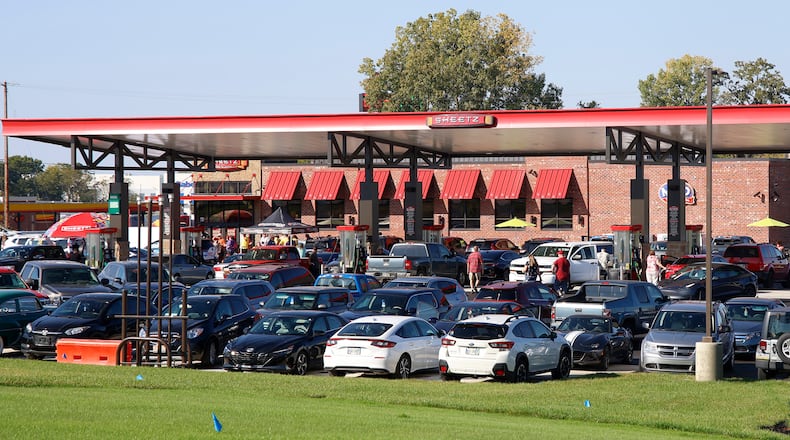More than a dozen Sheetz and Wawa locations have been proposed in the Dayton region in the past two years. Eight Sheetz sites have opened, including ones in Beavercreek, Fairborn, Franklin, Huber Heights, Springboro, Springfield and Vandalia.
Other chains — like Buc-ee’s, Casey’s and GetGo — are also expanding in Ohio.
Centerville and Kettering have both rejected proposals for stores of Pennsylvania-based Sheetz. In Kettering, a developer last fall proposed building a Sheetz site on vacant land owned by Kettering Health at 1490 W. Dorothy Lane, which is zoned for office use.
Centerville voted last month to put a yearlong freeze on permits for similar uses. Kettering City Council voted Tuesday to approve their temporary ban.
Kettering’s move has “been brought on by the market interest, particularly initially, the large gas stations that are popping up everywhere,” Mayor Peggy Lehner said.
There’s a “concern that, because they do require a large area of property and the requests for coming in for particular locations where we’re just not really sure the gas station of that nature is what we’re looking for,” Lehner added.
Kettering is also making changes to its long-term land use plan. The 16 months should give the city enough time to properly address those types of businesses specified in that document, city officials said.
“This is a pause that doesn’t necessarily mean that gas stations, car washes, kiosks, convenience stores or small box discount stores won’t be constructed in Kettering sometime in the future,” City Manager Matt Greeson said.
The city needs to “update our plans and our zoning regulations to make sure that when they are done in Kettering … that they’re done the right way and in the right place and we have the regulations in place to ensure the best long-term future for our community,” Greeson added.
The measure approved by Kettering does not impact future renovations for existing structures, he said.
Kettering’s council voted 6-1 in favor of the ban, with Bob Scott opposing the measure.
“While I understand and share the concern about some of these establishments, I feel it does send the wrong message to the business community at large,” Scott said.
Kiosks are defined as a freestanding building less than 500 square feet, while convenience stores would be range from 500 to less than 4,000 square feet that sells “a limited line of groceries, beverages, food and other household items,” according to Kettering records.
Small box discount store is defined in the resolution as 5,000 to 15,000 square feet, where “the majority of the items sold generally cost less than 10 dollars per item” or are 20-40% cheaper than a grocery store — fitting the description of many “dollar” stores.
Planning and Development Director Tom Robillard said the temporary ban is needed on the types of businesses outlined in the measure passed by the city because Kettering “has been getting a quite a number of inquiries on … land for certain uses.
“We are concerned that our zoning code doesn’t necessarily adequately protect the surrounding uses, particularly surrounding neighborhoods, from the impacts that these uses might have,” he said.
Kettering, Lehner said, “is a really well-developed city with very few vacant lots and buildable areas. We want to make sure that you have the best use possible for those” properties.
“So, as we’re developing that plan over the next year, we are also in the midst of this boom for gas stations,” she added.
About the Author

